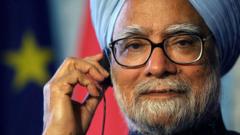Manmohan Singh’s life story is one of humility, tenacity, and pivotal reform, leaving a lasting impact on India amidst the complexities of his tenure.
Manmohan Singh: The Resolute Visionary of Indian Politics

Manmohan Singh: The Resolute Visionary of Indian Politics
Reflecting on the legacy of India's 'gentle prime minister' following his passing
In the wake of Manmohan Singh’s passing, tributes highlight the duality of his persona: a soft-spoken leader with extraordinary resolve who significantly influenced India’s trajectory. Singh, who served as the Prime Minister from 2004 to 2014, was honored with a state funeral, as the nation embarked on a seven-day mourning period. Although his leadership style was often seen as quiet and introspective, Singh's economic reforms and political decisions catalyzed India's transformation into a global economic player.
Despite having served in pivotal roles such as the Governor of the Reserve Bank of India and Union Finance Minister, Singh's public demeanor was characterized by humility rather than bravado. His tenure was marked by a laser focus on reforms that liberalized the economy, cultivating growth, and reducing poverty, while simultaneously navigating through numerous controversies that challenged his administration’s credibility.
Singh's supporters praised him for a principled approach to governance devoid of sensationalism. "He always wanted to be on the right side of the law," noted former colleague Kapil Sibal, underscoring Singh's reputation for integrity. Critics, conversely, disparaged his measured responses to political drama, labeling him ineffective amidst growing corruption scandals. Yet, the same qualities that led some to question his leadership were often the very traits that endeared him to the populace—an unassuming leader who drew people towards him with his thoughtful and relatable demeanor.
The essence of Singh's leadership was encapsulated in his significant gestures, notably his historic apology in Parliament for the 1984 anti-Sikh riots, a move that demonstrated profound sensitivity towards the Sikh community and sought healing in a historically polarized environment. His strategic signing of the nuclear deal with the United States in 2008 showcased not only his diplomatic acumen but also a firm commitment to placing India on a formidable global stage, despite facing immense opposition from various fronts.
His struggles, however, became evident as a series of corruption allegations plagued his administration, diminishing public goodwill. Singh's later years in office were not without tumult, as economic challenges and public outcry over pressing social issues, including the protests against corruption led by Anna Hazare, created a landscape ripe for criticism against his quiet disposition.
Even as the political climate turned increasingly hostile, Singh maintained a steadfast commitment to his principles, ultimately announcing he would not pursue a third term. "I believe history will judge me more kindly than contemporary media," he stated, illuminating a profound understanding of his legacy amid the convergence of admiration and skepticism.
Singh leaves behind a complex yet significant legacy as a leader who embodied both humility and tenacity. His efforts to uplift the middle class through economic policies and social reforms, coupled with his personal integrity, have carved a unique place for him in India's political landscape. The departure of this 'reluctant prime minister' serves as a reminder that the quietest voices can often carry the heaviest burden of leadership.
Despite having served in pivotal roles such as the Governor of the Reserve Bank of India and Union Finance Minister, Singh's public demeanor was characterized by humility rather than bravado. His tenure was marked by a laser focus on reforms that liberalized the economy, cultivating growth, and reducing poverty, while simultaneously navigating through numerous controversies that challenged his administration’s credibility.
Singh's supporters praised him for a principled approach to governance devoid of sensationalism. "He always wanted to be on the right side of the law," noted former colleague Kapil Sibal, underscoring Singh's reputation for integrity. Critics, conversely, disparaged his measured responses to political drama, labeling him ineffective amidst growing corruption scandals. Yet, the same qualities that led some to question his leadership were often the very traits that endeared him to the populace—an unassuming leader who drew people towards him with his thoughtful and relatable demeanor.
The essence of Singh's leadership was encapsulated in his significant gestures, notably his historic apology in Parliament for the 1984 anti-Sikh riots, a move that demonstrated profound sensitivity towards the Sikh community and sought healing in a historically polarized environment. His strategic signing of the nuclear deal with the United States in 2008 showcased not only his diplomatic acumen but also a firm commitment to placing India on a formidable global stage, despite facing immense opposition from various fronts.
His struggles, however, became evident as a series of corruption allegations plagued his administration, diminishing public goodwill. Singh's later years in office were not without tumult, as economic challenges and public outcry over pressing social issues, including the protests against corruption led by Anna Hazare, created a landscape ripe for criticism against his quiet disposition.
Even as the political climate turned increasingly hostile, Singh maintained a steadfast commitment to his principles, ultimately announcing he would not pursue a third term. "I believe history will judge me more kindly than contemporary media," he stated, illuminating a profound understanding of his legacy amid the convergence of admiration and skepticism.
Singh leaves behind a complex yet significant legacy as a leader who embodied both humility and tenacity. His efforts to uplift the middle class through economic policies and social reforms, coupled with his personal integrity, have carved a unique place for him in India's political landscape. The departure of this 'reluctant prime minister' serves as a reminder that the quietest voices can often carry the heaviest burden of leadership.



















